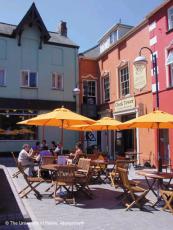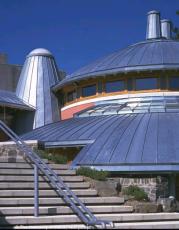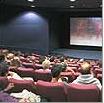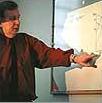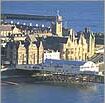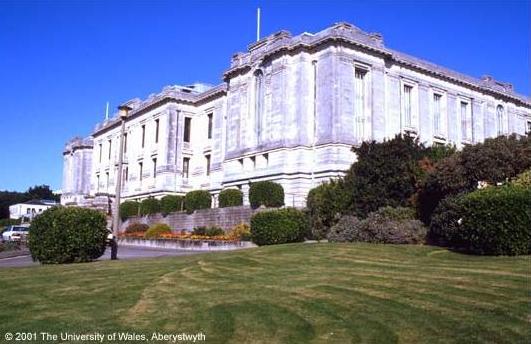AISB 2003 Convention:
Cognition in Machines and Animals
University of Wales, Aberystwyth
April 7th to 11th 2003
The Society for the Study of Artificial Intelligence
and the Simulation of Behaviour (SSAISB)
University of Wales, Aberystwyth
Convention Details
Important dates
|
Submission of full papers
|
7th March 2003
|
|
Deadline for early booking
|
22nd March 2003
|
|
Convention
|
7th to 11th April 2003
|
LaTeX style files
Style file: AISB03.sty
Example TeX file: AISB03.tex
Example bibTeX file: AISB03.bib
A PDF example of the output: AISB03.pdf
Breaking news
Don't forget to refresh your browser to get the latest news.
3 March 2003
Symposia timetables added
In addition to the convention timetable, most of the timetables for the individual symposia are now
avavilable, along with the lists of accepted papers. These can be found in the
programme section.
30 January 2003
Student bursaries available
There are 40 student bursaries available which may be awarded to any PhD student. The
bursaries can be used to pay the early registration fee (£70), and up to £100 towards travel
and accommodation costs.
See the registration section for more details.
14 January 2003
Keynote speakers have been announced
The keynote speakers at this year's AISB will be:
- Prof Sorin Solomon from the Hebrew University of
Jerusalem.
- Prof A. N. Meltzoff and Prof R. Rao from the University of Washington.
- Prof Giulio Sandini from the University of Genova.
- Prof Peter Hobson from UCL
- Prof Yiannis Aloimonos from the University of Maryland.
- Prof Gregor Schöner from Ruhr-Universität
See the Keynote Speakers section.
7 January 2003
Selected papers to be published in AISBJ
The editor of the AISB Journal (AISBJ)
has aggreed to publish a selection of the best papers from this year's AISB Convention.
02 December 2002
Registration is now open
See the registration section for details of how to register for AISB 2003.
Convention programme
Provisional programme
(See below for details of individual symposia.)
Key to symposia:
Imitation = Second International Symposium on Imitation in Animals and Artifacts
Agents = Adaptive Agents and Multi-Agent Systems
Methods = Scientific Methods for the Analysis of Agent-Environment Interaction
Vision = Biologically-Inspired Machine Vision, Theory and Application
Creativity = Artificial Intelligence and Creativity in Arts and Science
Blue underline = keynote speaker, linked to keynote speakers section
|
Time
|
Monday 7th
|
Tuesday 8th
|
Wednesday 9th
|
Thursday 10th
|
Friday 11th
|
7.30 -
9.00
|
Travel and
registration
|
Breakfast
|
09:00 -
10:30
|
Official Opening (15 mins)
A. N. Meltzoff and R. Rao
|
Peter Hobson (1 hr)
Imitation
Methods
Creativity
|
Imitation
Agents
Methods
Vision
Creativity
|
Imitation
Agents
|
10.30 -
11:00
|
Coffee Break
|
11:00 -
12:00
|
Imitation
Creativity
|
Imitation
Methods
Creativity
|
Imitation
Agents
Methods
Vision
Creativity
|
Imitation
Agents
|
12:00 -
13:00
|
Imitation
Creativity
|
Imitation
Methods
Creativity
|
Yiannis Aloimonos
|
Imitation
Agents
|
13:00 -
14:00
|
Lunch
|
---
|
14:00 -
15:00
|
Imitation
|
Imitation
Creativity
|
Gregor Schöner
|
Imitation
Agents
Vision
|
15:00 -
15:30
|
Imitation
Methods
Creativity
|
15:30 -
16:00
|
Coffee Break
|
16:00 -
17:00
|
Imitation
|
Giulio Sandini
|
Imitation
Methods
Creativity
|
Imitation
Agents
Vision
|
17:00 -
18:00
|
AISB AGM
|
Steam train trip
including Waterfalls
Buffet and Bar,
Coach return at
22.30
|
Sorin Solomon
|
18:00 -
19:00
|
Dinner
|
Dinner
|
19:00 -
21:00
|
---
|
Reception
|
---
|
Individual symposium details
Here you can find lists of all the papers accepted for presentation at the various symposia,
as well as detailed timetables for each symposium.
Convention theme
The theme of the convention is:
"Cognition in Machines and Animals"
This reflects current interest in such topics as: cognitive development, biologically-inspired
modelling, and learning in robotics. The coverage is intended to be wide and inclusive, with
general keywords such as:
- Perception and Sensory Systems
- Learning
- Adaptation and Development
- Motility and Action
- Robotics/Agents/Autonomous Systems
- Interaction and Communication
- Analysis/Synthesis of Behaviour.
The convention consists of five symposia, each presenting a selection of papers on a well
focussed AI topic. There will be some parallel tracks
and delegates are free to move between tracks according to their
interests in the overall programme. (Delegates are asked to indicate
their preferences at registration time.)
Each symposium has a programme chair(s), who administers their individual
programme. A programme committee referees extended abstracts of papers for presentation
at the event. See the Symposia details for information about the
individual symposia.
Symposia
Five symposia have been arranged:
- Second International Symposium on Imitation in
Animals and Artifacts
- Adaptive Agents and Multi-Agent Systems (AAMAS)
- Scientific Methods for the Analysis of Agent-Environment
Interaction
- Biologically-Inspired Machine Vision, Theory and Application
- Artificial Intelligence and Creativity in Arts and Science
Second International Symposium on Imitation in Animals and Artifacts
Chairs: Kerstin Dautenhahn and Chrystopher L. Nehaniv
Homepage:
http://homepages.feis.herts.ac.uk/~nehaniv/aisb03.html
Imitation has traditionally been regarded as easy, and often scornfully
dismissed as trivial, "cheating", or unworthy in comparison to higher
cognitive abilities. Yet this is an illusion. Explaining the imitative
abilities of humans and other animals has proved to be a complex subject.
Indeed, it is highly non-trivial even to say exactly what it means for two
behaviours to be the "same". The mechanisms are not well-understood, and
the connections to sociality, communication, development, and learning are
deep, as recent research from various disciplines has started to reveal.
Building robots and software agents that can imitate or learn socially from
other artificial or human agents in an appropriate way is an endeavour that
involves the deepest problems of connecting perception, experience,
context, and action. This four-day symposium will focus on state-of-the-art
research into this important area that helps us to understand adaptive
behaviour in social animals and machines.
The authors of the best contributions to the current symposium proceedings will be
invited to submit to a special thematic journal issue (details to be
announced).
The areas of interest of the symposium include but are not limited to:
- Trying to Imitate - Solving the Correspondence Problem between differently
embodied systems
- Learning by Imitation - harnessing imitation as a means to bootstrap the
acquisition of skills, knowledge, and appropriate behaviours
- The Social Functions of Immediate Imitation
- The Role of Imitation in the Development of Social Cognition
Learning of Perception-Action Mappings via Observation of the Self
or Others
- Imitation in Animals: studies and models, theories, comparisons to
mechanisms of Social Learning
- Imitation in Play, Creativity, and Cultural Transmission
- Imitation and Communication
- Robot Imitation: experiments, architectures, role of memory and prediction,
learning sequences of actions and acquiring behaviours
- Mechanisms of Imitation
- Applications in Interactive Systems
- Machine Learning Approaches to Perception and Action for Imitative
Behaviour
- Neurobiological Foundations of Imitation
- Imitation and Intentionality
- Programming by Example/Programming by Demonstration
- Behavioural Cloning
Adaptive Agents and Multi-Agent Systems (AAMAS)
Chairs: Dimitar Kazakov, Eduardo Alonso and Daniel Kudenko
Homepage:
http://www-users.cs.york.ac.uk/~kazakov/aamas/aamas-3.html
Adaptive Agents and Multi-Agent Systems (AAMAS) is an emerging
multi-disciplinary area encompassing Computer Science, Software
Engineering, Biology, as well as Cognitive and Social Sciences.
When designing agent systems, it is impossible to foresee all the potential
situations an agent may encounter and specify the agents' behaviour
optimally in advance. Agents therefore have to learn from and adapt to
their environment. This task is even more complex when the agent is
situated in an environment that contains other agents with potentially
different capabilities and goals. Multi-Agent Learning, i.e., the ability
of the agents to learn how to co-operate and compete, becomes crucial in
such domains.
The goal of this symposium is to increase awareness and interest in
adaptive agent research, encourage collaboration between ML experts and
agent system experts, and give a representative overview of current
research in the area of adaptive agents. The symposium will serve as an
inclusive forum for the discussion on ongoing or completed work in both
theoretical and practical issues.
Scientific Methods for the Analysis of Agent-Environment
Interaction
Chairs: Ulrich Nehmzow and Gregor Schöner
Homepage:
http://essexrobotics.essex.ac.uk/AISB/
Intelligent mobile robotics is increasingly advancing from an experimental engineering
discipline towards a maturing research field, using standardised robotic platforms,
experimental setups and procedures. However, reporting (of results and experimental
procedures) is still largely dependent on qualitative descriptions.
Furthermore (and partly due to this lack of quantitative descriptions), independent
verification and validation of experimental results is not commonly seen in mobile
robotics research. The same is true, more generally, for autonomous robots interacting
with humans, for agent systems acting in partly unknown environments and for nonlinear
dynamical systems models of behaviour.
Arguably, autonomous robotics and agent based approaches are now at a point where
quantitative descriptions of behaviour and experimental results, independent validation
and verification of results should become common practice. The symposium seeks to bring
together scientists working in any area that analyses the behaviour of "behaving agents"
in areas such as mobile robotics, autonomous agents, neural networks, neurosciene,
experimental psychology and related sciences that share a common interest in describing
behaviour quantitatively
Contributions are invited in the following areas:
- Autonomous (mobile) robotics in general, but especially the
analysis of robot behaviour
- Biology, ethology and psychology, especially focusing
on the analysis of behaving agents
- Mathematical and engineering methods for the analysis of
dynamical systems.
- Dynamical systems theory, deterministic
chaos, statistics, especially focusing on the analysis of physical
systems
- Computer Science, especially modelling and analysis of behaving
agents
Biologically-Inspired Machine Vision, Theory and Application
Chairs: Horst Holstein and Fred Labrosse
Homepage:
http://users.aber.ac.uk/ffl/BIMVTA03/
Computer vision has developed into a mature science over the last 40 years,
but current computer vision systems are vastly different from, and in
most cases lack the efficiency of, biological vision systems. Biological
vision therefore remains a strong metaphor for the design of machines that
simulate intelligent behaviour in visually sensed environments. Immensely
rewarding applications in human-machine interaction await advances in the
multi-disciplinary threads of machine vision, perception and cognition.
To promote a strong multi-disciplinary interaction, the symposium aims to
provide a forum for presentation and discussion of the state-of-the-art and
opening directions of research and technology related to
biologically-inspired machine vision. Papers are sought that advance the
theoretical foundations or present applications on this topic.
Presentations including, but not limited to the following, are encouraged
from both industry and academia:
- Computational models of animal visual systems
- Representations needed for high-level vision
- Role of learning and applications of perception in vision systems
- Human-machine interaction
- Motion tracking and 3-D reconstruction
- Behaviour simulation and understanding
- Face and gesture recognition
- Recognition and interpretation
- Architectures and languages for image processing
- Real time image analysis, segmentation
- Performance comparisons, evaluations, or measures
- Software tools, associated resources and application (e.g. humanoid robot)
Contributions bringing together two or more of the above themes, to give a
better understanding of a framework towards a more intelligent machine
interpretation of images, are especially welcome.
Artificial Intelligence and Creativity in Arts and Science
Chairs: Pablo Gervas and Simon Colton
Homepage:
http://www.doc.ic.ac.uk/~sgc/events/aisb03/
Submissions are invited for the AISB'03 Symposium on AI and Creativity
in Arts and Science. Recently, creativity and creative behaviour have
become serious targets for AI study. Worthwhile inroads into the
computational study of the creative mind have been made, and systems
exhibiting creative behaviour have been constructed. This was reflected
in the successful AISB symposia on creative and creativity-related
topics at AISB'99 (Edinburgh), AISB'00 (Birmingham), AISB'01 (York) and
AISB'02 (Imperial). This symposium aims to bring together researchers
interested in all forms of creative reasoning. The aim is to allow work
focussed on different aspects of creative behaviour to be compared and
contrasted. To this end, the programme committee invites the submission
of extended abstracts covering creative behaviour in the arts and the
sciences, including, but not restricted to:
- Computational support for creative people
- Computational models of creative processes
- The philosophy of computational creativity
- AI systems which can be argued to exhibit creativity
- The assessment of creativity in AI programs.
Keynote speakers
We are pleased to announce the following invited speakers for the keynote sessions at AISB this year:
Prof Sorin Solomon
Theoretical Physics Department, Hebrew University of Jerusalem.
"Perception, Cognition and Creativity Emerging from Simple Microscopic Agents".
[Talk abstract]
Prof A. N. Meltzoff and Prof R. Rao
University of Washington.
"Imitation learning in infants and robots: Towards probabilistic computational models".
[Talk abstract]
[Speaker bio]
Prof Giulio Sandini
LIRA-Lab, Department of Communication,Computer and System Sciences, University of Genova.
"Human Babies and Robot Cubs".
[Talk abstract]
[Speaker bio]
Prof Peter Hobson
UCL Department of Psychiatry & Behavioural Sciences.
"The interpersonal origins of thinking: How humans achieve what
computers (so far) haven't".
[Talk abstract]
[Speaker bio]
Prof Yiannis Aloimonos
Computer Vision Laboratory Institute for Advanced Computer Studies, and
Department of Computer Science, University of Maryland
"Visual space-time geometry: a geometry of thought".
[Talk abstract]
[Speaker bio]
Prof Gregor Schöner
Institut für Neuroinformatik, Ruhr-Universität Bochum, Germany
"Dynamic field theory and embodied cognition".
[Talk abstract]
[Speaker bio]
Registration
Registration is now open on the registration page.
Students and SSAISB members are eligible for a significant discount on registration fees.
Delegates can join AISB when
registering in order to qualify for the discount.
Accommodation and meals will be
available on the University campus, very close to the convention (see
accommodation details), and may also be booked on the registration form.
Please note that registration forms must be returned by post, electronic forms
cannot be accepted.
Student bursaries
There are 40 student bursaries available which may be awarded to any PhD student.
The bursaries can be used to pay the early registration fee (£70), and up to £100 towards travel
and accommodation costs.
Students should apply for a bursary when they register by sending the following with their fully
completed registration form:
- A letter (on headed note-paper) from your supervisor, confirming your student
status.
- A brief letter detailing why you would particularly benefit from the AISB
Convention, and from receiving a bursary.
All applications for student bursaries must be recieved by the 22nd March.
Travel and local information
The convention will be held at the University of Wales, Aberystwyth.
Please note that Aberystwyth is located in mountainous country and so
travel arrangements need
to be planned in advance. For example, central London is about 5 hours
away by road or rail.
This means Heathrow and other London airports are less convenient for air
travellers (6+ hours)
than Birmingham airport which is well connected by rail (about 3 hours).
Manchester airport is also
an alternative (3 hours) with rail connections.
The travel details page has information about how
to reach Aberystwyth, and maps of Aberystwyth
and the region can be seen and downloaded from the University's web pages
here. In addition, there
is a pdf called
"Getting to the University" available.
For delegates arriving by train, a special bus has been arranged which will go from the
train station to the University. The following trains will be met (arrival times):
- Sunday 6th April: 19:07, 22:53.
- Monday 7th April: 13:19, 15:18, 17:20, 19:26, 21:38.
Accommodation has been pre-booked on the main University campus, and can be reserved during
registration. These rooms are situated very close to the convention, and within easy walking distance
of the reception venue. See
accommodation details
If you have any further queries about local
arrangements, including travelling to Aberystwyth, please contact Meinir Thomas at
the Conference Office: met@aber.ac.uk.
Organised events
Two main events have been organised for conference attendees:
Reception at the National Library of Wales - Tuesday 8th April - the
convention reception will be held in the imposing
National Library of Wales building,
with its stunning views over the town of Aberystwyth and out to sea.
-
Rheidol Railway excursion - Wednesday 9th April - a trip has been
organised on the scenic Vale of
Rheidol Railway. The Rheidol steam train runs on narrow gauge tracks through
beautiful Welsh countryside from Aberystwyth to Devils Bridge. On arrival at Devils
Bridge people are welcome to visit the famous waterfalls, and a buffet meal will be
provided. The total cost of this excursion is £30.
Further information about this trip is available
here
Links
If you have any questions about registration, or local arrangements, such as accommodation or catering,
please contact Meinir Thomas at the conference office: met@aber.ac.uk.
If you have general questions about the AISB'03 convention, please contact the local chair, Mark Lee:
mhl@aber.ac.uk.
If you have any questions about the programme please contact Joanne Walker:
jnw@aber.ac.uk.
The Society for the Study of Artificial
Intelligence and the Simulation of Behaviour (AISB)
Aberystwyth University
Aberystwyth tourism site
Web pages designed by Joanne Walker, e-mail
jnw@aber.ac.uk.
